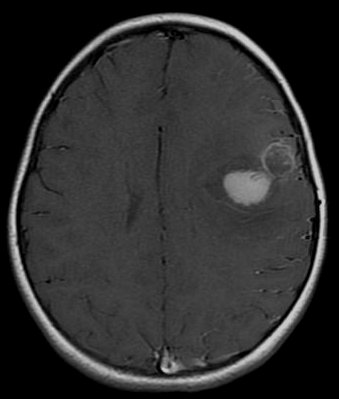Central nervous system primitive neuroectodermal tumor
Editor-In-Chief: Prab R Tumpati, MD
Obesity, Sleep & Internal medicine
Founder, WikiMD Wellnesspedia &
W8MD medical weight loss NYC and sleep center NYC
| Central nervous system primitive neuroectodermal tumor | |
|---|---|

| |
| Synonyms | CNS PNET |
| Pronounce | N/A |
| Specialty | N/A |
| Symptoms | Headache, nausea, vomiting, seizures, neurological deficits |
| Complications | Hydrocephalus, metastasis |
| Onset | Typically in children and young adults |
| Duration | Variable |
| Types | Medulloblastoma, pineoblastoma, ependymoblastoma |
| Causes | Unknown |
| Risks | Genetic predisposition, radiation exposure |
| Diagnosis | MRI, CT scan, biopsy |
| Differential diagnosis | Medulloblastoma, atypical teratoid rhabdoid tumor, ependymoma |
| Prevention | N/A |
| Treatment | Surgery, radiation therapy, chemotherapy |
| Medication | N/A |
| Prognosis | Variable, depends on type and stage |
| Frequency | Rare |
| Deaths | Varies |
Central nervous system primitive neuroectodermal tumor (CNS PNET) is a rare and highly aggressive cancer that primarily affects children and young adults. It is a type of neuroectodermal tumor that originates from the neural crest cells in the central nervous system.
Classification[edit | edit source]
CNS PNETs are classified as embryonal tumors, a category of neoplasms that also includes medulloblastoma and atypical teratoid rhabdoid tumor (ATRT). They are further classified based on their location in the brain, with the most common types being cerebral, pineal, and spinal.
Symptoms[edit | edit source]
The symptoms of CNS PNETs vary depending on the location of the tumor. Common symptoms include headache, nausea, vomiting, and changes in behavior or personality. In some cases, the tumor may cause seizures or neurological deficits.
Diagnosis[edit | edit source]
Diagnosis of CNS PNETs typically involves a combination of neuroimaging techniques, such as magnetic resonance imaging (MRI) and computed tomography (CT) scans, and biopsy to confirm the diagnosis. Histopathology and immunohistochemistry are also used to differentiate CNS PNETs from other types of brain tumors.
Treatment[edit | edit source]
Treatment for CNS PNETs usually involves a combination of surgery, radiation therapy, and chemotherapy. The goal of treatment is to remove as much of the tumor as possible and to kill any remaining cancer cells. Despite aggressive treatment, the prognosis for CNS PNETs is generally poor, with a five-year survival rate of less than 50%.
Research[edit | edit source]
Research into CNS PNETs is ongoing, with a focus on understanding the genetic and molecular mechanisms that drive these tumors. This research may lead to the development of new treatments and improve the prognosis for individuals with this disease.
Gallery[edit | edit source]
This article is a neuroscience stub. You can help WikiMD by expanding it!
Transform your life with W8MD's budget GLP1 injections from $125
W8MD offers a medical weight loss program NYC and a clinic to lose weight in Philadelphia. Our W8MD's physician supervised medical weight loss centers in NYC provides expert medical guidance, and offers telemedicine options for convenience.
Why choose W8MD?
- Comprehensive care with FDA-approved weight loss medications including:
- loss injections in NYC both generic and brand names:
- weight loss medications including Phentermine, Qsymia, Diethylpropion etc.
- Accept most insurances for visits or discounted self pay cost.
- Generic weight loss injections starting from just $125.00 for the starting dose
- In person weight loss NYC and telemedicine medical weight loss options in New York city available
- Budget GLP1 weight loss injections in NYC starting from $125.00 biweekly with insurance!
Book Your Appointment
Start your NYC weight loss journey today at our NYC medical weight loss, and Philadelphia medical weight loss Call (718)946-5500 for NY and 215 676 2334 for PA
Search WikiMD
Ad.Tired of being Overweight? Try W8MD's NYC physician weight loss.
Semaglutide (Ozempic / Wegovy and Tirzepatide (Mounjaro / Zepbound) available. Call 718 946 5500.
Advertise on WikiMD
|
WikiMD's Wellness Encyclopedia |
| Let Food Be Thy Medicine Medicine Thy Food - Hippocrates |
Translate this page: - East Asian
中文,
日本,
한국어,
South Asian
हिन्दी,
தமிழ்,
తెలుగు,
Urdu,
ಕನ್ನಡ,
Southeast Asian
Indonesian,
Vietnamese,
Thai,
မြန်မာဘာသာ,
বাংলা
European
español,
Deutsch,
français,
Greek,
português do Brasil,
polski,
română,
русский,
Nederlands,
norsk,
svenska,
suomi,
Italian
Middle Eastern & African
عربى,
Turkish,
Persian,
Hebrew,
Afrikaans,
isiZulu,
Kiswahili,
Other
Bulgarian,
Hungarian,
Czech,
Swedish,
മലയാളം,
मराठी,
ਪੰਜਾਬੀ,
ગુજરાતી,
Portuguese,
Ukrainian
Medical Disclaimer: WikiMD is not a substitute for professional medical advice. The information on WikiMD is provided as an information resource only, may be incorrect, outdated or misleading, and is not to be used or relied on for any diagnostic or treatment purposes. Please consult your health care provider before making any healthcare decisions or for guidance about a specific medical condition. WikiMD expressly disclaims responsibility, and shall have no liability, for any damages, loss, injury, or liability whatsoever suffered as a result of your reliance on the information contained in this site. By visiting this site you agree to the foregoing terms and conditions, which may from time to time be changed or supplemented by WikiMD. If you do not agree to the foregoing terms and conditions, you should not enter or use this site. See full disclaimer.
Credits:Most images are courtesy of Wikimedia commons, and templates, categories Wikipedia, licensed under CC BY SA or similar.
Contributors: Prab R. Tumpati, MD






